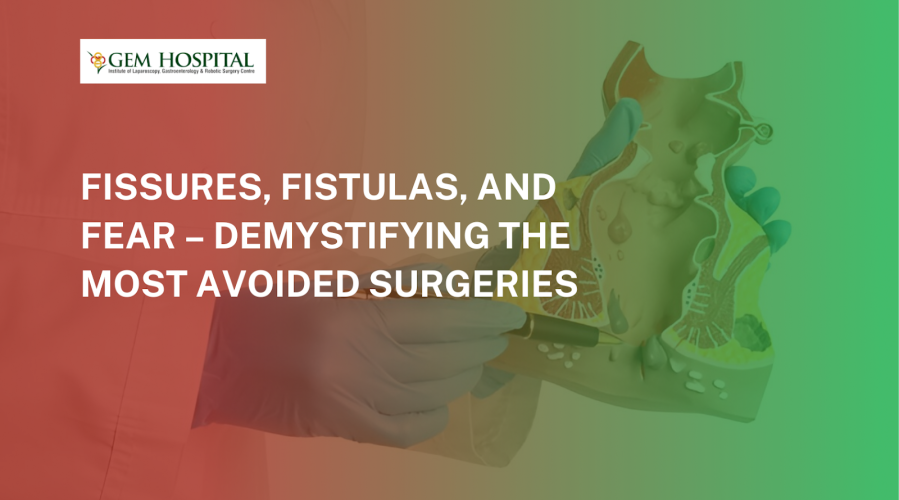Consult experienced hernia doctors in Chennai for expert surgical care. Advanced diagnosis, safe hernia surgery, and faster recovery with specialized treatment.
Fissures, Fistulas, and Fear – Demystifying the Most Avoided Surgeries

When it comes to surgical procedures, very few generate as much discomfort and fear as those involving the anal region. Among the most commonly misunderstood conditions are fissures and fistulas, two different but often confused disorders that affect the anal canal. Due to their sensitive nature and associated stigma, many patients delay treatment, tolerating pain far longer than they should.
Let’s break the silence. This blog will help you understand what fissures and fistulas surgery really involves, when it’s necessary, and why timely medical intervention is the key to long-term relief.
What Are Anal Fissures and Fistulas?
Before we delve into treatment, it's important to understand the difference between these two conditions:
- Anal Fissure: A small tear within the lining of the anus which can be caused by passing hard stools, chronic constipation or prolonged diarrhea, and is associated with sharp pain and bleeding, during or after a bowel movement.
- Anal Fistula:A small tunnel between the end of the bowel and skin near the anus, usually developing in response to an anal abscess (collection of pus), and can produce some discharge, irritation, and continuing infections.
Though both conditions affect the same region, their causes, symptoms, and treatments are quite different.
Symptoms That Shouldn’t Be Ignored
Ignoring symptoms only worsens the condition and can lead to more complex surgeries down the line. Watch out for these warning signs:
- Persistent pain during or after bowel movements
- Blood on toilet paper or in the stool
- Itching or irritation around the anus
- Pus or fluid discharge
- Recurrent abscesses near the anal region
- Swelling or a visible opening near the anus
If you experience any of the above symptoms, especially repeatedly, consult a colorectal specialist immediately.
Why Is Surgery Sometimes the Best Option?
Non-surgical treatments such as dietary changes, laxative use, and topical ointments, are helpful in the early stages. However, when chronic pain, infection or making non-healing wounds a reality, surgery becomes necessary for fissures and fistulas.
Common Surgical Procedures Include:
- Lateral Internal Sphincterotomy (LIS):
A minimally invasive procedure where a portion of the internal anal sphincter is cut to reduce pressure, promoting healing of the fissure. - Fistulectomy or Fistulotomy:
Depending on the complexity of the fistula, either the tract is laid open to heal from the base, or it is surgically removed. - Seton Placement:
In complex or high-risk fistulas, a surgical thread is placed through the fistula tract to promote drainage and allow gradual healing. - Laser or VAAFT (Video-Assisted Anal Fistula Treatment):
Newer, minimally invasive approaches with reduced healing time and lower recurrence.
Benefits of Timely Fissures and Fistulas Surgery
Many patients delay surgery out of fear, but modern colorectal procedures are much safer and faster than people assume. The advantages include:
- Long-term pain relief
- Reduction in recurrence and infection
- Faster healing with advanced techniques
- Minimally invasive options now available
- Shorter hospital stays and quick return to normal life
Post-Surgery Recovery: What to Expect
Recovery depends on the procedure but is generally smooth with the right care. Here’s what helps:
- Maintain hygiene in the anal region
- Sitz baths to soothe the surgical area
- Soft, fiber-rich diet to ease bowel movements
- Avoid straining and prolonged sitting
- Complete the full antibiotic course if prescribed
- Follow up regularly with your surgeon
When Should You Consider Surgery?
You should speak to a specialist about fissures and fistulas surgery if:
- Symptoms persist beyond 6 weeks
- Recurrent infections or abscesses occur
- Previous treatments have failed
- Daily life is disrupted by pain or discharge
- You notice new or worsening symptoms
Why Choose GEM Hospital for Fissures and Fistulas Surgery?
GEM Hospital is a leader in minimally invasive colorectal procedures, and we provide the latest, most effective and patient-centric care for painful anorectal conditions. With the best health infrastructure, world-class colorectal surgeons, and dedication to privacy and compassionate care, GEM Hospital can ensure that the pain and suffering does not need to go on.
Whether you have been dealing with recurrent infections, long-standing pain, or are just unsure what your symptoms mean, our team will walk you through a diagnosis, treatment, and complete recovery approach that is individualized.
Book Your Appointment Today
Stop the fear of your condition affecting your life or wanting to be free from pain. At GEM Hospital, we provide our patients with a safe and fast recovery time while ensuring their comfort during the fissures and fistulas surgery, which is a minimally invasive technique.
It’s time to heal! Call GEM Hospital now or Book your appointment online, because we want to take a step to healing with you. We value your health, dignity and recovery.
Blogs & Article
Get advanced liver transplant treatment in Chennai with expert surgeons, modern technology, and comprehensive care for safe and successful outcomes.
Get advanced piles treatment in Erode with expert doctors. Safe procedures, modern technology, and effective care for fast relief and recovery.


